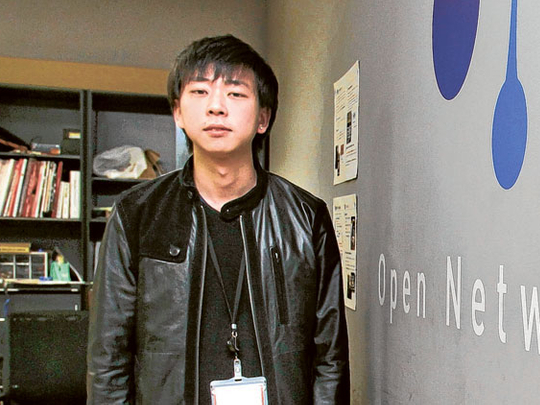
Tokyo: For an emerging generation of Japanese innovators, the dream isn't a job for life at a big company. They have new ambitions, and they're determined to go places. Especially Silicon Valley.
Small but growing numbers of Japanese entrepreneurs are jumping into the startup scene in northern California, particularly since the earthquake and tsunami last March. They include Naoki Shibata, who took the plunge by giving up the sort of life many Japanese in past decades spent their lives trying to attain.
Only 30, Shibata had an executive-level position at online retailing giant Rakuten and an assistant professorship at the prestigious University of Tokyo, where he earned a Ph.D.
Last June he launched AppGrooves, an iPhone application discovery tool.
"I wanted a global company from the first moment," he said. "If you want to reach a global market, then you have to start from Silicon Valley."
Shibata and others say they are seeing a major uptick in Japanese entrepreneurs migrating to Silicon Valley or seriously contemplating a move, as their country struggles with two decades of economic stagnation and a rapidly shrinking and ageing population.
Some venture capitalists believe the earthquake, tsunami and the nuclear disaster that followed compelled many Japanese to take an increasingly uncertain future into their own hands.
Pushed against the wall
"Whenever there's a natural disaster, people are pushed and pressed against the wall," said Annis Uzzaman, one of the founders of Fenox Venture Capital. "And they want to come out as number one." Attorney Yoichiro Taku, a partner at Silicon Valley firm Wilson Sonsini Goodrich & Rosati, has taken on AppGrooves as a client, as well as Japanese-founded social network startups Wondershake and Mieple. Taku, who has among the most active startup practices in the US, said it's the most Japanese startup traffic he has ever seen in his Silicon Valley career.
The Global Entrepreneurship Monitor, which measures attitudes toward starting new businesses around the world, found in its 2010 report that Japan ranked lowest among 22 advanced economies.
Journalist Lisa Katayama and designer Tomo Saito launched the Tofu Project in San Francisco last year. The unique initiative brought 10 young Japanese entrepreneurs to California in late October for a weeklong boot camp in Silicon Valley-style design thinking and innovation.
Satoshi Suzuki, the 22-year-old president of a social networking startup called Wondershake, took part in the programme. He describes Wondershake as an icebreaker for the real world, designed to facilitate immediate face-to-face connections at events, schools and other venues.
"No one expects me to succeed, and 99 per cent of people don't succeed, so a lot of people could just give up," he said.
"But the main reason I'm doing this is because the product is really something I want to create for the world."
Japan losing pioneering spirit
Technology and innovation have long been sources of pride in Japan. The country's phenomenal economic development in the 20th century was fuelled by visionary entrepreneurs and industrialists whose ventures are now some of the country's most well-known brands like Sony and Panasonic. But as Japan grew into one of the world's biggest economies, it seemed to lose its pioneering spirit. Business leaders, officials and academics in recent years have blamed the country's dearth of entrepreneurship on a mix of social and structural factors that constrict new innovators. The Japanese, they say, have become risk-averse, opting to stick to the safety of lifetime employment at established companies. Venture capital is scarce. Exits in the form of mergers and acquisitions or initial public offerings are too difficult.










